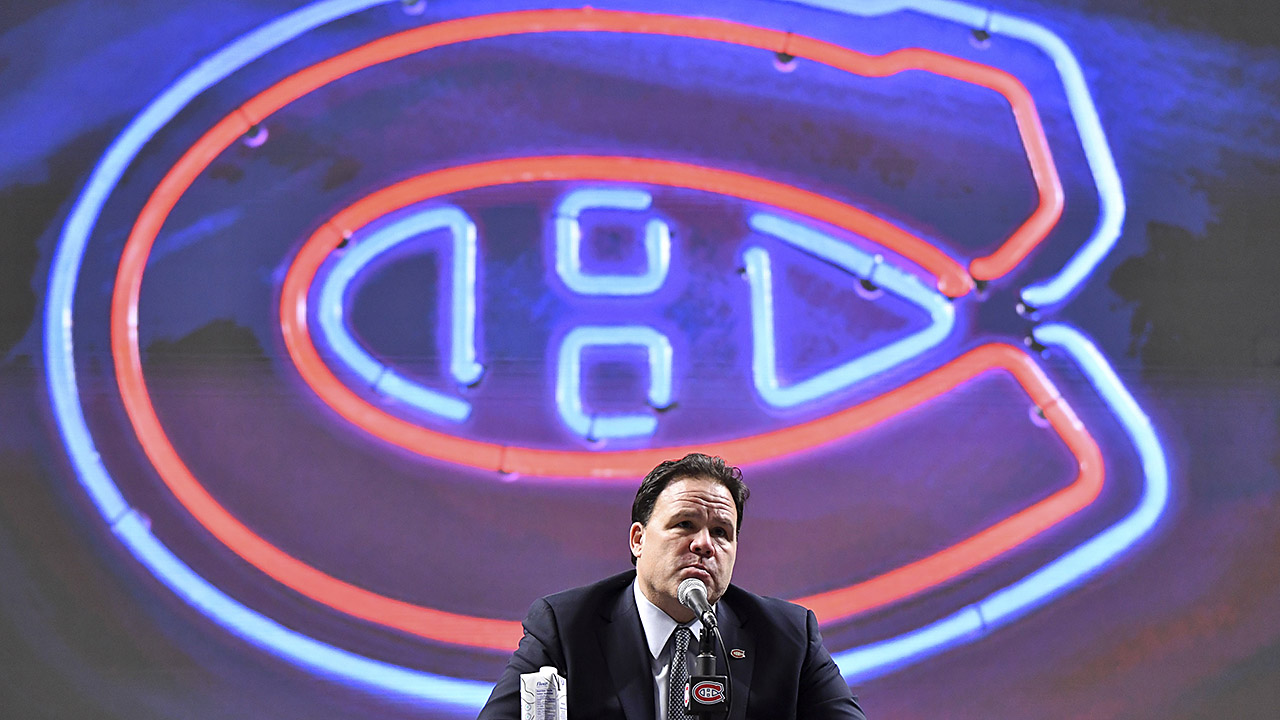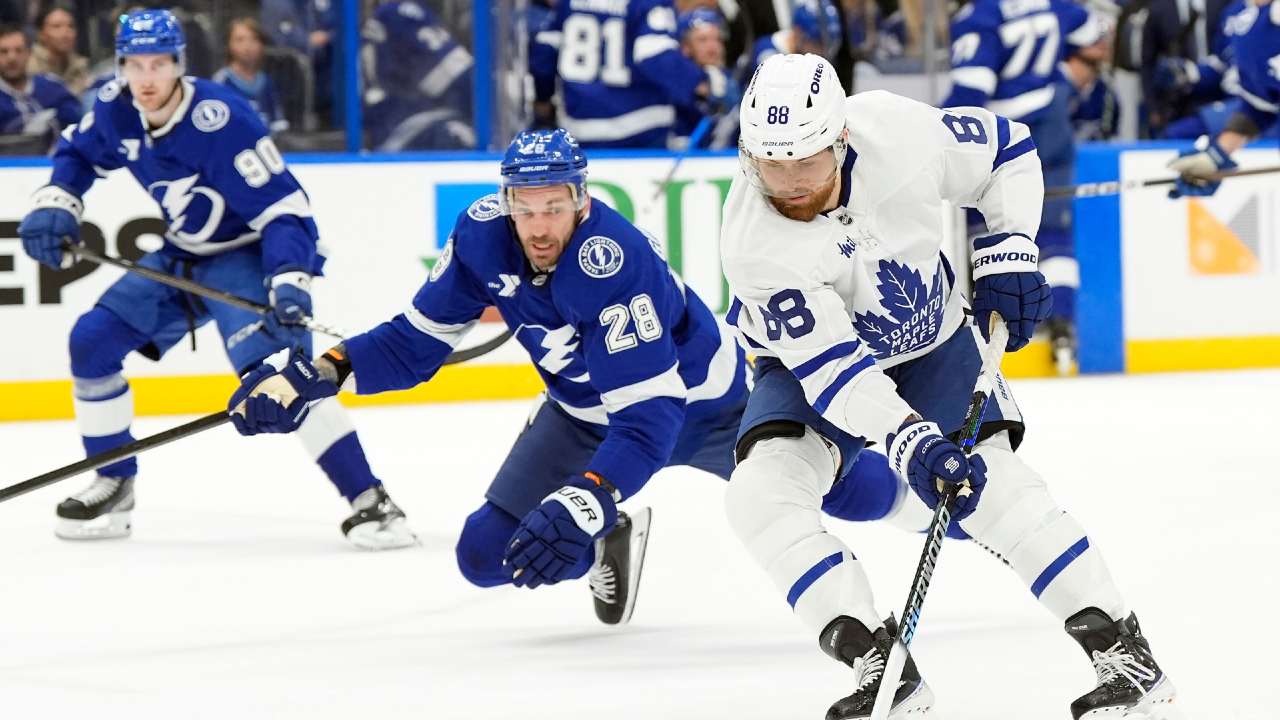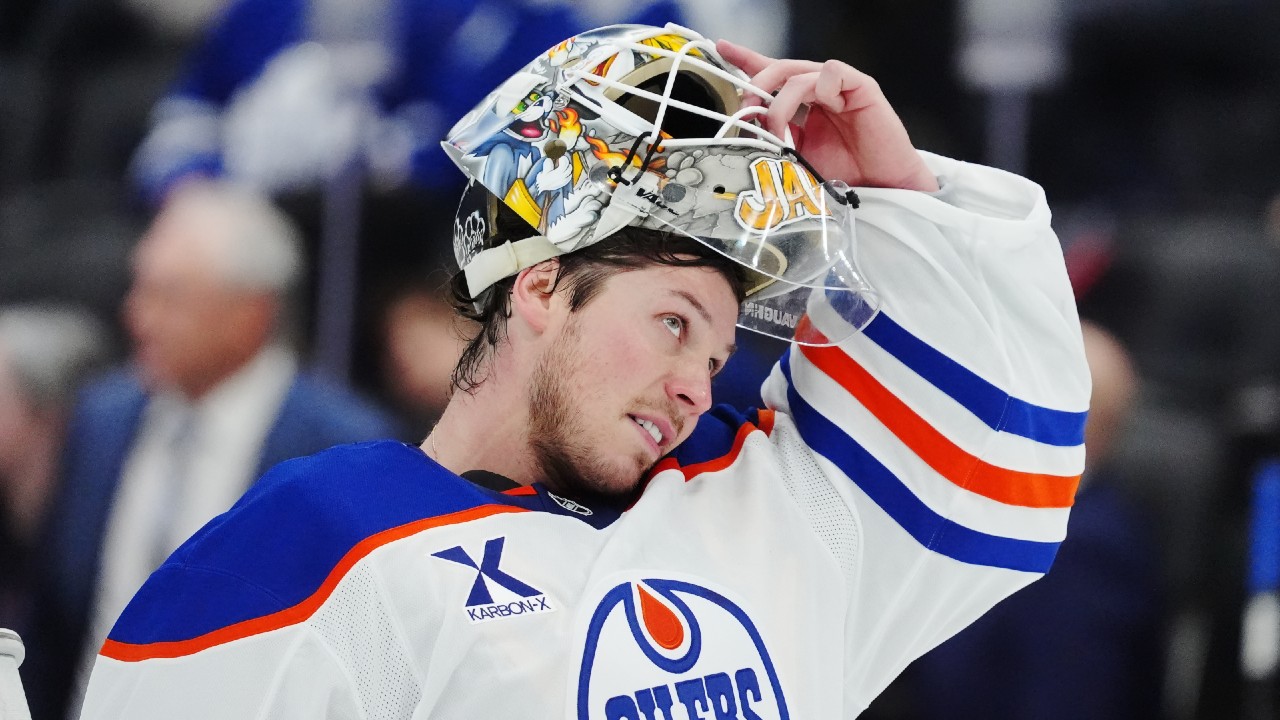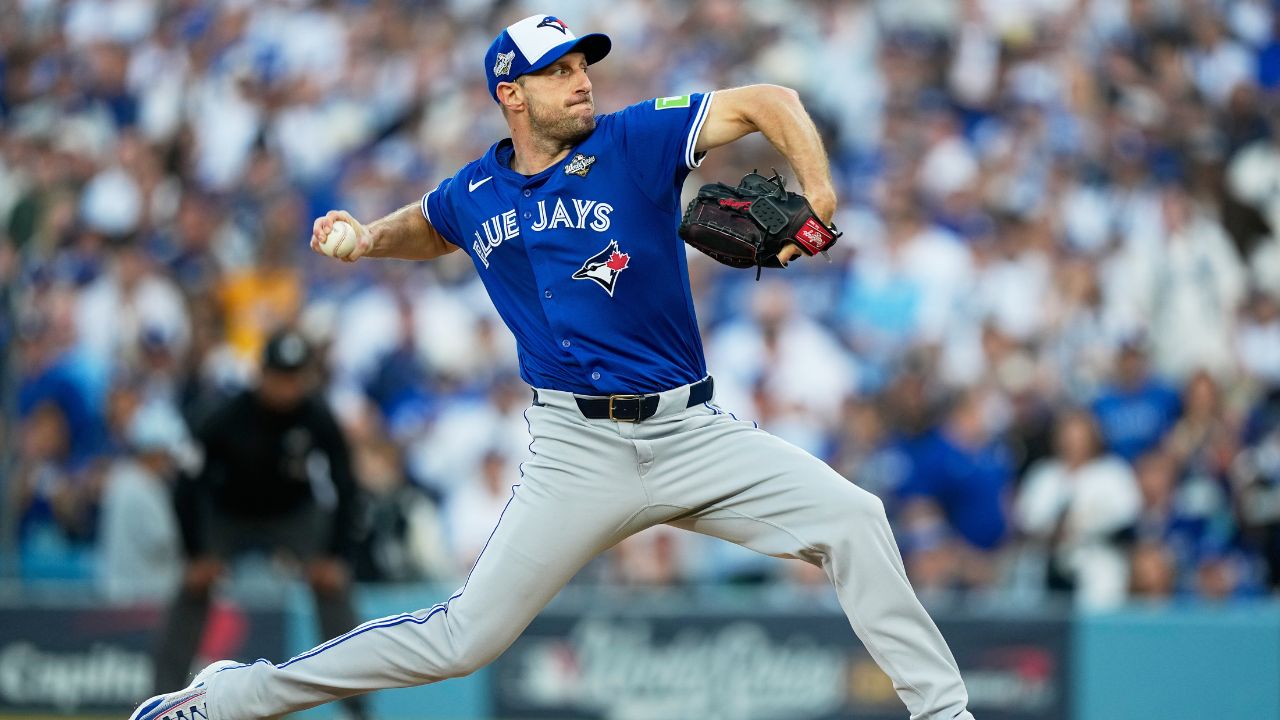
MONTREAL — Joshua Roy had always been able to coast on his raw talent and Nostradamus-level sense of anticipation to put himself in the best spots to either set plays perfectly or finish them himself. With things coming even easier to him this season than they had in previous ones in the Quebec Major Junior Hockey League, he was doing it again.
Relying on his skill and sense helped Roy go first overall to the Saint John Sea Dogs in the 2019 QMJHL Draft. Doing so played a big role in him leading the league in scoring in 2022. And, for just a brief stint this season, with goals and assists flying off his stick with ease, Roy reclined once again into his comfort zone.
But it wasn’t long after that happened that he received a video call from Montreal Canadiens director of hockey development Adam Nicholas.
The message, according to the 19-year-old Saint-Georges-des-Beauce, Que., native was simple.
“He was saying he doesn’t just want me to be a dominant player in the Q,” Roy told Sportsnet in mid-January, “he wants me to build NHL habits to be a good NHL player.
“Then we went over some video, and he talked to me about the specific areas where they wanted me to focus, and I appreciated it.”
In the months following his March of 2022 hire with the Canadiens, Nicholas — who first turned a small business catering to advanced hockey players in Maine into consulting gigs with UMass Lowell and the Toronto Maple Leafs — developed a method for calls like the one he had with Roy, working with what he refers to as a “dashboard” he built for every Canadiens player in the system.
On Sept. 29 — a day before he and his new team was introduced to the media for the first time — Nicholas explained to us that his dashboard focused on the strengths of each player and, with reliance on SportLogiq data, tracked different skills they’d need to regularly execute to play to those strengths.
Before Roy helped Canada capture a gold medal with a dominant performance at the 2023 world junior championship, Nicholas spoke to him to reinforce that he needed to re-engage in more battles for the puck, that he needed to take the inside lane more frequently when in possession of it, and that he had to put himself in the high-danger scoring area more frequently without it — not just to score more but to be playing more of a game that will enable him to eventually realize his potential at the pro level, where goals and assists won’t come as easily.
Nicholas was able to say the data showed Roy had fallen off in those categories while explaining how much stronger his play was when he was more consistent in them.
“It’s amazing being able to work with him,” Roy said. “When he shows you those things and gives you a clear plan to work with, how are you not going to listen? I know he wants what’s best for me, I know the Montreal Canadiens want what’s best for me, so for sure I’m going to work at it. I did, and I think I was able to show that at the world juniors and that I can play that complete pro game.”
Seeing how Roy scored his five goals, manufactured his six assists, served as an elite penalty killer, and did most the dirty work on his line with phenom Connor Bedard and elite Dallas Stars prospect Logan Stankoven over seven games to help Canada win gold was a nod to one of the biggest advancements the Canadiens have made off-ice over the last year. Credit to the player, for sure, but the way he excelled was evidence of the commitment to the type of dedicated development work this organization was so sorely lacking before Jeff Gorton was hired as executive vice president of hockey operations in November of 2021.
When we spoke to the former general manager of the New York Rangers and Boston Bruins — almost a year ago to this day — about the enormous task he was facing to take the Canadiens’ organization from analog to digital, he placed the greatest emphasis on development, at one point exclaiming, “We don’t even have a skills coach, which has been standard stuff around the NHL for years.”
That was pretty damning evidence of how the most iconic franchise in the sport had been coasting on its reputation as the New York Yankees of hockey rather than living up to it.
The decision to hire Nicholas is one of many examples of how much that has changed under Gorton. And it is perhaps the best one because it illustrates to what end the Canadiens have pursued reinstating their status as industry leaders. They could’ve hired a skills coach to conduct one-timer seminars, or power-skating clinics, or whatever the heck this is, but they instead hired someone who could refine skills while also building out development plans for every player they own rights to.
Nicholas was tabbed to work with every prospect and pro to not only optimize their shots but also their processing of the game. He was given an extremely well-rounded staff, which already housed Francis Bouillion and Rob Ramage and expanded with the hires of Scott Pellerin and Marie-Philip Poulin and the repurposing of Nick Carriere. And he was empowered to not only be present at most NHL practices but also to run parts of them because he had the ability to design every exercise to simulate game action and put players in game-like environments to make development more focused and purposeful.
The Canadiens stepped outside the box bringing him in, just like Gorton did by hiring former player agent Kent Hughes to be general manager and just like both Gorton and Hughes did in taking Hall of Famer Martin St. Louis off his son’s bantam-league bench and appointing him head coach of the Canadiens.
Egos of all parties being checked at the door has brought the Canadiens from well behind the curve in player development to ahead of it, as evidenced not only by the progress of a player like Roy but also by the progress of several young players in Montreal who are under St. Louis’ and Nicholas’ constant supervision.
“You have to have buy-in from everyone to have Adam be as present and influential, but he helps bridge player development to the coaching staff,” said Gorton in an exclusive interview with Sportsnet earlier this winter. “And I think the players understand that. And I think Marty understands that when you have a player development staff participating every day in what the players are doing, they’re going to get better on an individual basis. And when you have all three sectors of development, analytics and coaching intertwined and working on each player every day, I think that’s going to do well.”
When we sat down with Gorton in February of 2022, he had said achieving that type of harmony would be at the root of modernizing the Canadiens.
When we reconvened with him at the end of this past November — months after he expanded the Canadiens bureaucracy in every department by also hiring pioneer Chris Boucher to head up an analytics team that now includes data analyst Miranda McMillan and technology expert Philippe Desaulniers, Nick Bobrov as co-director of amateur scouting, and scouts Teddy Purcell, Neil Little, Gordie Clark, Albie O’Connell and Billy Ryan — he pointed to the process of deciding to choose Juraj Slafkovsky with the first-overall pick in the 2022 NHL Draft as a sample of how that harmony took root.
“I think it’s really, in that instance, when it’s the first pick overall, it’s about connecting your departments on this huge decision,” Gorton said. “You have a number of scouts that went out and saw these players and put together a ratings chart and a list of how we would want to do it and what we would want to do, and then it’s going back with Chris and his analytics team and talking it over to see if it makes sense and asking what does it say to him and what does he see in the upside of each player to break it down. The scouts go out and do their work, and then, because Chris was a late add, it was coming back to ask what he sees.”
Boucher was hired in May after two seasons of scouting with the San Jose Sharks — and after having built an impressive career with the analytics company providing the data Nicholas used to build his dashboard. Prior to that, the Canadiens were outsourcing analytics and, as Gorton acknowledged upon his own hire, that was no longer going to be a viable way of conducting business.
The decision on Slafkovsky was the first opportunity to really leverage having that work done in-house.
The management group leaned on it, exhausted all the other possibilities with their scouting directors, and a consensus was reached just before the draft. Through the process, a more modern approach to hockey operations for the Canadiens was cemented.
What came along with it was just as vital.
“Now, based on the conversations we had and all the aspects that went into making that draft decision, there was a trust factor established, and all the scouts are now leaning on Chris and calling him to ask what he sees in this guy in Saskatoon who isn’t being rated anywhere,” Gorton said. “Now we have the ability to have Chris running numbers, and that gives all of us another way of looking at things. I think we’re really just starting to work together and do all this, but everyone can see the benefit.
“Adam’s team is working with Marty’s team and working with analytics. Marty’s staff is working with analytics. It’s not just checking a box; this department has a seat at the table, and we trust them, and we think their contribution is huge.”
It was a contribution of sorts beforehand, but certainly not one embedded into every fibre of hockey operations prior to Gorton’s arrival. He knew how far they had fallen behind in this way, and how desperately they needed to catch up. With Hughes’ help, he met with several candidates before finding someone who could truly push them forward.
Boucher is doing that, just as Nicholas and St. Louis are, and those are just some of the big changes that have been made on the hockey side.
There have been several other pivotal ones Gorton has overseen outside of hockey operations to bring the Canadiens up to speed.
A little over a year ago, with the pandemic still peaking, players were leaving the team’s state-of-the-art practice facility with bagged lunches and relying on Uber Eats and Doordash for sustenance on the road. Strict health protocols in Quebec and Canada unquestionably helped create those circumstances, as Gorton pointed out when we spoke first spoke.
But he also promised they would change. “There’s got to be a different way of thinking for us.”
Over their first few months in their respective positions, Gorton and Hughes opened the door to honest feedback from their players. Gorton said they all needed to be reassured management truly cared, had their best interests at heart, and that they would do whatever it took to give them the best of everything so they could just focus on their on-ice responsibilities.
With the pandemic subsiding, he and Hughes — with owner Geoff Molson’s support — delivered. They tapped the team’s nutrition consultant, Renée Racine, to go on the road with the Canadiens earlier this season to survey what options were being provided on the plane and ensure they were the best.
She consulted with other NHL nutritionists to ensure the Canadiens were getting the healthiest options both on their way to and at opposing practice facilities and hotels, and made all the necessary adjustments.
Back home at the Canadiens’ practice facility in Brossard, Que., Gorton and Hughes had the players lounge renovated and decided to employ private chefs to cook.
“The food is so much better, it’s amazing,” Canadiens goaltender Samuel Montembeault said. “And the lounge is great. Last year it was really small. We didn’t have TVs or couches or anything like that. It was pretty much just counters and one table in the middle. They moved what was (former equipment manager Pierre Gervais) Gerv’s office and put all the equipment managers together. Now there’s a kitchen, couches, three TVs and video games. It’s fun, and we spend much more time there than we did. It’s great. It’s brought us more together.”
Montembeault isn’t the only Canadiens player raving about it.
“I think the food has been amazing,” defenceman David Savard said. “They brought in chefs to cook for us, and I think it’s nice for them to have the freedom to create new things every day. It’s harder when you’re catering from outside. Everything is made here now, which helps us have great options. I think all of those little changes makes it so much more positive an atmosphere. Just looking at the food side of it, you see the guys staying more at the rink, hanging after practice, eating and bonding.
“It’s the same thing on the ice, where you see players hanging around longer than usual. Every time you want to work on something after practice, you always have a coach to work on something with you. With Adam, we have six coaches on the ice all the time. I’m not sure any other teams have that.
“All those little changes like that make a big difference. The food and the lounge are small things but will make a big difference for the team and on the long run of everyone’s career. It’s been a really good, positive change for us.”
Gorton felt the impact was tangible after watching the Canadiens surprise out of the gate with 10 wins and 21 points through the first 20 games of the season.
He also felt the vibe around the team had shifted significantly from where it was at last year.
“Having that personal touch would be something the players would appreciate,” he said. “It was a harder situation bringing food from afar. It just became obvious that if we renovated a little bit of the kitchen and gave them a bit more room to enjoy their time and bring their families — some guys bring the kids and play video games in there — it would create the kind of atmosphere we had in mind. And a good atmosphere obviously helps a team succeed.
“It’s developed over time. The chefs and all the people in there are working so hard and doing such a good job of making everything so first class.
“Have to give Geoff (Molson) credit. He was really helpful by saying yes to the things we asked for. We’ve asked for a lot, and he’s never really said no. And all of this has been with the players and their families in mind, and he understands that and has been great.”
When we spoke with Molson at the NHL’s board of governor meetings in December, he felt the organization was advancing step-by-step under Gorton.
“You have to listen to your players and show them you care,” Molson said, echoing those words Gorton used with us last February. “The renovations and chefs are examples. There are so many other examples, like getting the wives and girlfriends more involved in everything and we revived the mothers’ trip this year. It starts with the leadership. Jeff and Kent spent the last number of months building and thinking about things we could do differently, and those things were just some of the good things that have been done.”
The hiring of Alex Case in team services was another. Gorton had worked with Case for years in New York, and had seen him bend over backwards in the same role for the Rangers so he engaged him to come help the Canadiens get everything they need both at home and on the road.
When Sean Monahan was traded to the team over the off-season, Case immediately got in touch and arranged his travel to Montreal. He picked him up at the airport, gave him a tour of the city, the Bell Centre and the practice facility, and told him to get in touch for any and all requests.
That’s standard stuff around the league, but it wouldn’t be entirely accurate to say the Canadiens were meeting the standard.
“Alex went above and beyond and treated me so well, and I can’t say how much I appreciated that,” said Monahan.
So many Canadiens players sang Case’s praises to us.
Slafkovsky, 18, experiencing his first year in North America, was one who expressed how grateful he’s been to be able to lean on Case for everything from procuring extra tickets to games for visiting family members to helping him get a car.
“He’s the man, and he takes care of all the boys,” Canadiens forward Michael Pezzetta said. “Just a great resource. He’s really good at his job, and he’s a super friendly guy. He helps family, he helps my girlfriend. I remember when I got here, he made a reservation for me and my buddy at this restaurant in New York, and we were in the back room just us and some celebrities eating dinner. It was a sick setup. We had such a good dinner and felt like, ‘Wow, this guy’s the real deal.’”
Case has provided the personal touch Gorton believed was necessary for a team to have in 2023.
“He’s very good at what he does,” Gorton said. “He just has a good way about him, and I knew that he would do anything he could to help the players with anything they and their families needed. He’s done that. Right away, he’s got their respect. He’s worked really hard, and he seems to have fit into Montreal, which is nice. But, with just the way he carries himself, players have always enjoyed and respected him. Knowing everything he did in New York, the same thing is happening now. As we’ve said, this is part of making sure the players have everything they need so they don’t have to concentrate on anything but playing and getting better.”
The decision made earlier this season to bring on mental performance coach Jean Francois Menard as a consultant was very much made with that aim.
Even a small scan of Menard’s LinkedIn profile gives one a sense for how highly accomplished he is in his field. He started his work with Cirque de Soleil artists, helped Olympians who went on to combine for 17 medals over the last four Games and trained Super Bowl champions. He’s a best-selling author of two books and a master public speaker who’s delivered keynote addresses to everyone from the FBI to NASA to employees at major corporations like Pepsi and to members of the Toronto Blue Jays.
When Menard first addressed the Canadiens earlier this season, they immediately understood the value he could bring.
“It’s not all about what you do in the gym or on the ice,” Monahan said. “You’ve got to be mentally right and feel good and be in a good headspace every day you come to work.”
Others, on the condition of anonymity, expressed the value in being able to get one-on-one time with Menard — and not just when they’re struggling, but especially when they’re thriving.
He is, after all, a mental performance coach.
When we caught up with the 40-year-old founder of Kambio Performance on a road trip earlier this season, he talked about how he emphasizes the importance of rest and recovery to his clients, about how some of the greatest and most enduring athletes have all prioritized those things on top of all the physical work, and he talked about how he aims to train players on removing distractions in an age when they are more pervasive than ever before. He was engaging, intelligent, calculating and attentive, and it was easy to come away from that brief conversation understanding how having someone like him at their disposal advances the Canadiens’ cause.
Again, it shows how far they’ve come in such a short time.
As for the other steps the Canadiens will take, Gorton said amateur scouting and analytics will get beefed up over time.
“But we’ve already done so many different changes that we want to let it evolve a little bit and let everyone get to know each other,” he added. “It doesn’t happen overnight. We want everyone settling into all different departments and, as we cross over, it’s important to get everyone on the same page before we keep adding, and adding and adding. We’ll see where we are and where it takes us.”







